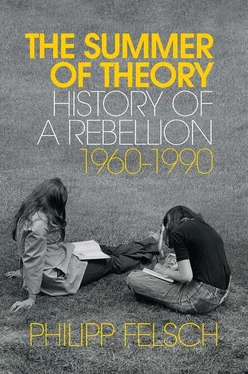Introduction: What Was Theory?
Sentenced to three years’ imprisonment for arson in 1968, Andreas Baader discovered letter-writing. He described the torment of solitude, ranted about the guards, and asked his friends to supply him with essentials. Besides cured meats and tobacco, that meant, most of all, books. He had people send him the student movement’s favourite authors, Marx, Marcuse and Wilhelm Reich, which he had only known from hearsay up to then. ‘Mountains of theory, the last thing I wanted’, he wrote to the mother of his daughter. ‘I work and I suffer, without complaining of course.’ Later, in the maximum-security prison at Stammheim, it was up to his lawyers to feed his hunger for reading material. At the time of his death, there were some 400 books in his cell: a respectable library for a terrorist who was notorious among his comrades for his recklessness. Without a doubt, Baader played the part of a jailhouse intellectual, just as he had previously played the revolutionary. Yet, at the same time, there was a great deal of seriousness in his studies. His letters indicate that he felt a need to catch up 1– after all, the struggle to which he had dedicated himself was founded on theoretical principles. 2In a different time, Baader would have taken up painting perhaps, or begun writing an autobiographical novel. Instead, he plunged – almost in spite of himself – into theory.
Now that the intellectual energies of ’68 have long since decayed to a feeble smouldering, it is hard to imagine the fascination of a genre that captivated generations of readers. Theory was more than just a succession of intellectual ideas: it was a claim of truth, an article of faith and a lifestyle accessory. It spread among its adherents in cheap paperbacks; it launched new language games in seminars and reading groups. The Frankfurt School, post-structuralism and systems theory were best-selling brands. West German students discovered in Adorno’s books the poetry of concepts. As the sixties dawned, the New Left rallied under the banner of its ‘theory work’ against the pragmatism of the Social Democrats: those who would change the world, they proclaimed, must start by thinking it through. But the thinking they had in mind had nothing to do with the philosophy of professors who stuck to interpreting the classic texts or the meaning of Being. It was concerned less with eternal truth and more with critiques of the dominant conditions, and under its scrutiny even the most mundane acts took on social relevance. Jacob Taubes, professor of the philosophy of religion in Berlin, saw his students reading the works of Herbert Marcuse with an intensity reminiscent of the zeal ‘with which young Talmud scholars once interpreted the text of the Torah’. 3On campus, theory conferred upon its readers not only academic capital, but also sex appeal. Marcuse led to Marx, and Marx to Hegel: those who wanted to have a say in the discussion got themselves the twenty-volume Suhrkamp edition of Hegel’s complete works. 4Only after the shock of the terrorists’ debacle in Stammheim and Mogadishu did any doubts about the canon of the ’68 generation mature into open resistance. New thinking came to Germany from Paris and did away with the tonality of dialectics. The books of Deleuze and Baudrillard called for a different kind of reading from those of Marx and Hegel. They seemed to have a more important purpose than the search for truth, and in the course of the 1980s theory metamorphosed into an aesthetic experience. And when ecology laid constraints of quantities and limits on the speculative imagination of the seventies, thorny philosophy set out to infiltrate the art world.
The first impetus to write this book dates from several years ago. In the spring of 2008, the editor of a journal of intellectual history called me to ask for an article on the German publishing house Merve. The editor was planning an issue about West Berlin, the walled-in city on the front lines of the Cold War, which Merve had supplied with theory for twenty long years. Peter Gente, the founder of Merve, had retired from publishing and sold his papers to an archive to finance his sunset years in Thailand, and so the time seemed ripe for historical retrospection. 5Although I wasn’t a Berliner, Merve was a byword to me too. There was no way I could refuse.
Merve has been called the ‘Reclam of postmodernism’ – Reclam, of course, are the publishers of the ‘Universal Library’, the yellow, pocket-sized standard texts that no German student can do without. Merve was the German home of postmodernism, and practically owned the copyright to the German word for ‘discourse’. 6Merve had made a name for itself in the 1980s, primarily with translations of the French post-structuralists. Its cheaply glued paperbacks were a guarantee of advanced ideas, and the pop-art look of their un-academic styling was ahead of its time. The coloured rhombus on the cover of the Internationaler Merve Diskurs series was a well-established logo whose renown rivalled that of the rainbow rows of Suhrkamp paperbacks.
I remember well the first Merve titles I read. It wasn’t easy, in Bologna in the mid-1990s, to get them by mail order. My intention had been to spend a semester there studying with Umberto Eco, but Eco’s lectures turned out to be a tourist attraction. Whatever the famous semiotician was saying into his microphone at the far end of the lecture hall was easier to assimilate by reading one of his introductory books. In retrospect, that was a stroke of luck, because it forced me to look for an alternative. And the search for a more intense educational experience led me – twelve years after his death – to Michel Foucault. My Foucault wasn’t bald and didn’t wear turtlenecks, and although he occasionally spoke French, his Italian accent was unmistakable. But his grand rhetorical flourishes and his tendency to overarticulate his words are engraved in my memory. In his best moments, he came very close to the original. Valerio Marchetti had heard the original Foucault at the Collège de France in the early 1980s, if I remember correctly, and absorbed – as I was later able to verify on YouTube – his way of talking as well as his way of thinking. He was a professor of early modern history at the University of Bologna. His lecture course, which was attended by very few students, was devoted to a topic only a Foucauldian could have come up with: ‘Hermaphroditism in France in the Baroque Period’. I was spellbound on learning of the seventeenth-century debates in which theologians and physicians had argued about the significance of anomalous sex characteristics. 7I had never heard of such a thing at my German university, where philosophy students read Plato and Kant. I hung on Marchetti’s every word, attending even the Yiddish course that he taught for some reason, and started reading the literature he cited: Michel Foucault, Paul Veyne, Claude Lévi-Strauss, Georges Devereux … I waited weeks for the German translations to arrive in the post. I read more than I have ever read since, and collected excerpts on coloured file cards. In the heat of the Italian summer, the ‘microphysics of power’ and the ‘iceberg of history’ stuck to my forearms. 8
In 2008, I hadn’t touched these books in years. Their spines crumbled with a dry crackle when I opened them. Inside I discovered vigorous pencil marks, reminding me what a revelation theory had been to me in those days. But at a decade’s remove, that experience seemed strangely foreign: it seemed to belong to an intellectual era that was now irretrievably past. I went to Karlsruhe to have a look at the materials that Peter Gente had turned over to the Centre for Art and Media Technology. In the forty heavy boxes that had not yet been opened – much less catalogued – perhaps I would find a chapter of my own Bildungsroman. They contained the publisher’s correspondence with the famous – and the less famous – Merve authors, along with the paper detritus that lined the road to over 300 published titles: newspaper clippings, notes, budgets, dossiers … While Gente rested, I supposed, in the shade of coconut palms, I immersed myself in his papers. Only gradually did I realize that what I was looking at were not the typical assets of a liquidated business: it was the record of an epic adventure of reading.
Читать дальше












